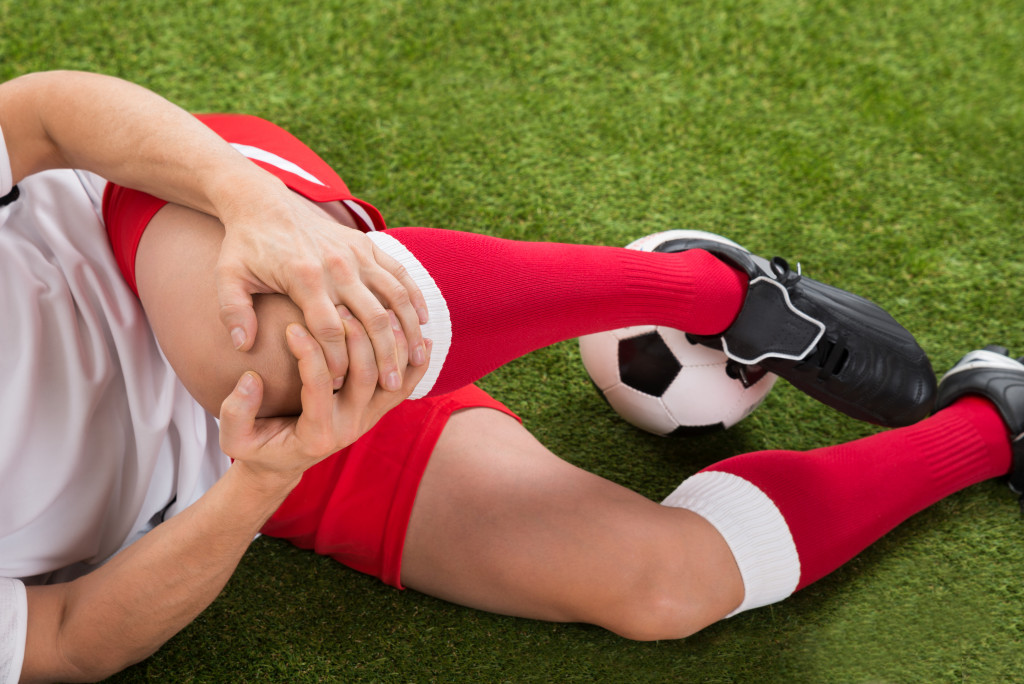Injuries are a part of sports. They can happen to anyone, at any time, and for various reasons. While some injuries are unavoidable, there are many things you can do to prevent them from happening in the first place. This article will discuss the different types of sports injuries, their causes, and how to treat them.
What Are the Different Types of Sports Injuries?
While there are many types of sports injuries, they can generally be classified into one of four categories:
1. Traumatic Injuries
These occur when a force from the outside world comes into contact with the body and causes damage. Common examples include fractures, dislocations, and concussions. Most people can fully recover from these injuries with proper treatment and rehabilitation.
2. Overuse Injuries
Not all injuries are caused by trauma. Overuse injuries, such as tendinitis and stress fractures, occur when the body is repeatedly subjected to the same force or motion. These types of injuries often develop over time and can be challenging to treat.
3. Degenerative Injuries
Degenerative injuries, such as arthritis, are caused by the wear and tear of the joints, ligaments, and tendons over time. These injuries are more common in older athletes but can also affect younger athletes participating in high-impact sports.
4. Infectious Injuries
Although less common, infections can occur if bacteria or viruses enter the body through a cut or break in the skin. Infectious injuries can be severe and, if left untreated, can lead to long-term health problems.
What Causes Sports Injuries?
Many factors can contribute to a sports injury. Some of the most common include:
Poor Training Practices
One of the most common causes of sports injuries is poor training practices. Training too hard, too fast, or without proper warm-ups and cool-downs can put unnecessary stress on the body and lead to injuries. Not allowing the body enough time to recover from previous workouts can also lead to injuries.
Improper Equipment
Using the wrong type of equipment or wearing ill-fitting gear can also increase your risk of sustaining a sports injury. For example, wearing shoes that don’t provide proper support can lead to ankle sprains or other foot and leg injuries. So, it’s important to make sure you have the right equipment for your sport and that it fits properly.
Playing Through Pain
Trying to play through pain is also a common cause of sports injuries. Ignoring an injury can lead to further damage and may even result in a more serious injury. It’s important to listen to your body and seek medical attention if you are experiencing pain.

Lack of Warm-Up or Cool-Down
Failing to warm up or cool down properly before and after physical activity can also lead to injuries. Warming up gradually prepares the body for exercise and helps to prevent strains and other injuries. Cooling down after exercise allows the body to slowly return to its resting state and helps to prevent blood pooling in the muscles.
How Can Sports Injuries Be Treated?
The treatment of a sports injury will depend on the type, severity, and location of the injury. For mild injuries, home care such as RICE (rest, ice, compression, elevation) may be all that is needed. More serious injuries may require medical attention and may even need surgery. For example, a facial and dental injury sustained during a contact sport may require cosmetic dentistry surgery to repair the damage. These types of injuries often require a team of medical professionals to provide the best care possible.
How Can Sports Injuries Be Prevented?
Sports injuries can happen to anyone who participates in sporting activities, whether it be casually or competitively. Here are some tips to help prevent sports injuries:
- Warm-up and cool down properly: This helps prepare your body for physical activity and reduces the risk of injury.
- Stretch: Stretching helps improve flexibility, which can help you move more easily and reduce the risk of injury.
- Wear the right gear: Make sure you wear the proper protective gear for your sport. This can help reduce the severity of injuries.
- Stay hydrated: Drinking plenty of fluids helps keep your body healthy and functioning properly.
- Listen to your body: Stop playing and rest if you’re feeling pain or discomfort. Ignoring pain can lead to further injury.
It’s also important to see a doctor if you think you may have sustained an injury. Early diagnosis and treatment can help prevent further damage and help you get back to your favorite activities sooner.
As you can see, sports injuries can happen to anyone. But by taking some simple precautions, you can help prevent them. So, the next time you hit the playing field or court, keep these tips in mind. Stay safe and injury-free!

